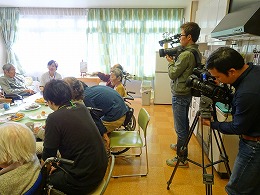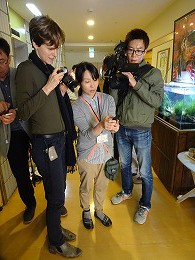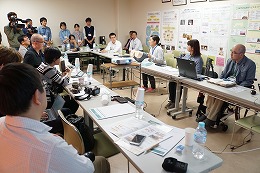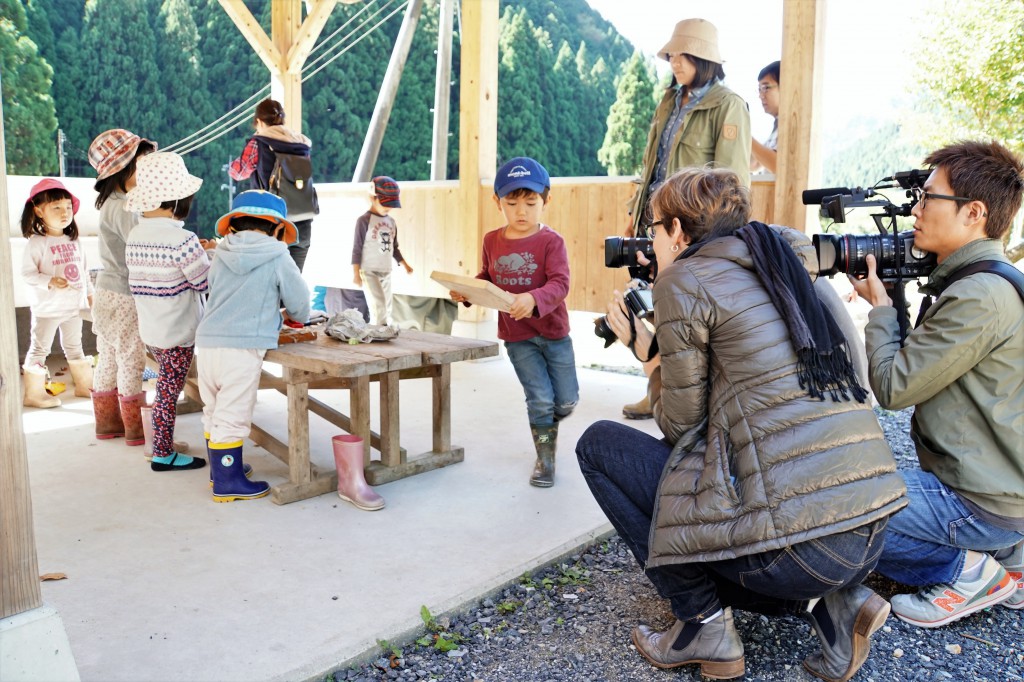実施日 : 2016年10月14日(金) - 15日(土)
Report: Tottori Press Tour
投稿日 : 2016年12月05日
This press tour took place while the World Trails Conference, an international conference concerned with the use of and conservation of nature trails, was being held in Tottori prefecture. The tour not only covered Tottori’s natural beauty, it also dealt with policies to encourage relocation to the prefecture with the lowest population in Japan, and efforts by local companies to create employment and stimulate the local economy. This press tour was sponsored by Tottori Prefecture Government Tokyo Office, with planning cooperation by the FPCJ, and nine journalists participated from China, Germany, South Korea, Switzerland, and Vietnam.
-Click here for further details on the tour
-Click here for a log of real-time updates from during the tour
[Day 1]
(1) Briefing on Tottori Prefecture Policies to Support Relocation and Raising Children (Tottori Industrial Promotion Organization)
The two-day trip began with Mr. Yasuhiro Saio, head of the Tottori Living Support Section, and Ms. Miki Motoki, head of the Child-Raising Support Section, explaining Tottori’s policies that have led to the prefecture having among the highest number of people relocating to it, targeting young families with children in particular.
The journalists asked questions including whether promoting relocation to Tottori was stealing population from other areas also suffering from depopulation, what the attraction of relocating to Tottori was compared to other prefectures, and whether foreigners were moving to Tottori as well.
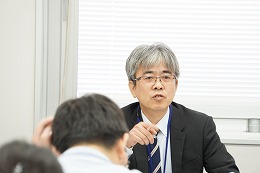
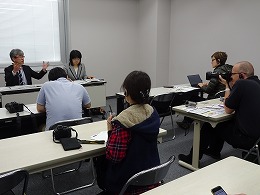
(2) LASSIC
The tour visited Lassic, an IT company creating jobs in regional areas in an effort to split up the heavy concentration of jobs in the Tokyo area. First, Vice-President Tomohiro Nishio spoke about the company motto of “stimulating local economies with IT, from Tottori,” and the systems in place to allow workers to work in ways that fit different lifestyles. Next, the journalists interviewed employees who had moved from the city to Tottori. Hearing that one of those employees takes long vacations during the summer to focus on a different job, one journalist asked whether or not the company management was actually happy about accepting these different working styles. Other questions included reasons for relocating, and changes to lifestyle and income after relocating.
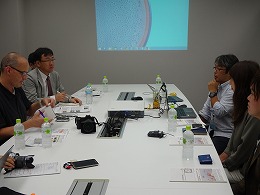
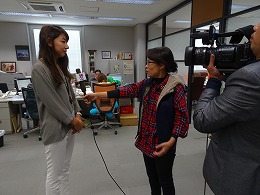
(3) Marutanbo Forest Kindergarten
Forest kindergartens, where the children play outside in nature instead of inside a building, are one factor encouraging people to relocate to Tottori. The journalists visited a campground in the town of Chizu in the morning, where the children were splitting logs and cutting vegetables to cook lunch. Some journalists taped interviews with the children directly. In the afternoon, after interviewing Ms. Saeko Nishimura, the director of Marutanbo Forest Kindergarten, the journalists visited a share house that is available as temporary housing for families interested in sending their children to Marutanbo, and interviewed the current residents. The journalists asked Ms. Nishimura what other reasons she would give for relocating to Chizu aside from forest kindergartens, whether accidents occur while students are out in the forest, how Marutanbo students handle being in groups once they move on to elementary school, and how Marutanbo differentiates itself from the competition.
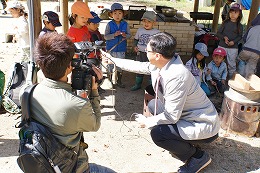
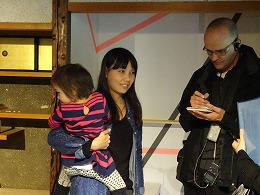
(4) Mitaki-en (Lunch)
For lunch, the group visited a restaurant built in the style of traditional Japanese homes located in Chizu’s Ashizu Valley. The journalists were impressed by the location, with its ample vegetation and numerous streams flowing through the restaurant grounds. The group ate a lunch made using local mountain vegetables, in the restaurant’s traditional thatched-roof building.
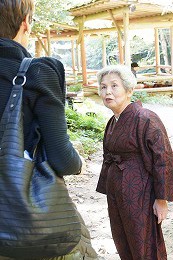
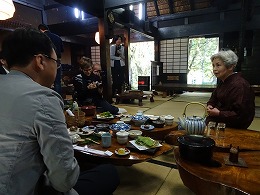
[Day 2]
(5) Interview with Governor Shinji Hirai
Governor Hirai talked about the strengths of Tottori, the prefecture with the lowest population in Japan. Since government organizations are smaller, decisions can be made quickly in order to provide residents with high-quality services, and it is possible to manage projects compactly, with the governor taking direct responsibility for them. Journalists asked questions including about whether the governor thought it was more important to attract businesses or people, as Tottori’s policies seem to focus directly on bringing people into the prefecture; what the benefits of being a small prefecture are considering the increasing competition over bringing in new residents; and whether he had any requests for the national government.
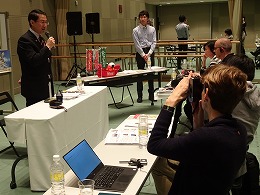
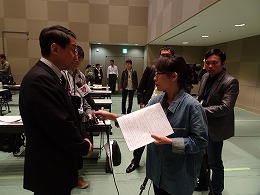
(6) World Trails Conference (WTC)
Mr. Hiroaki Kishida, director of an NPO called Mirai, was involved in the WTC taking place in Tottori, and gave an explanation about the WTC before it began. After attending the opening of the conference, the tour walked along one of the walking courses, Nariishi-no-hama in Kotoura. Unfortunately, the waves were weak that day so it was not possible to hear the characteristic sound of the round stones along the beach clicking as they are pushed by the waves, but the journalists were still able to film and photograph locals enjoying walking along the beautiful beach.
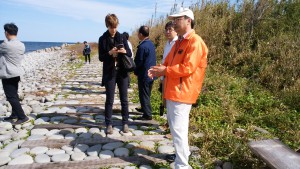
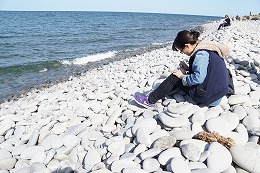
(7) Good Smile Company Rakutsuki Factory
The tour visited the factory of figure and toy maker Good Smile Company. This was the first factory the company made in Japan (located in Kurayoshi), and factory manager Mr. Tetsuji Tanimoto guided the journalists around the figure production line where they filmed and photographed workers carrying out delicate tasks, cutting down and coloring small parts. The group asked questions including why the company decided to bring some of its production back to Japan from China despite China having merits such as less expensive personnel costs, why they chose to locate the factory in Kurayoshi, whether there were plans to automate the production line, and how much exports contributed to overall sales.
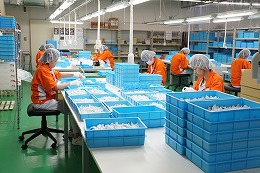
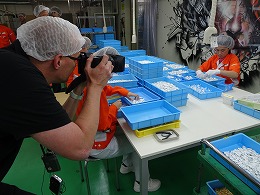
(8) Kohoen Social Community Service (Yonago Kohoen)
Kohoen operates nursing homes and geriatric care facilities in cities in Tottori as well as in Tokyo, with over 120 locations. The tour visited their facility in Yonago, and learned about Yuririn, a urine measurement device to help estimate the timing of when to change users’ diapers, and a system using smartphones to help identify what kind of care users appreciate. The journalists also interviewed Ms. Syah Musiyar, a staff member who came to Japan as part of the first year of the Japan-Indonesia Economic Partnership Agreement. Questions included what the cost-performance ratio of Yuririn was, and why Kohoen had decided to introduce its pioneering smartphone system to improve service.
